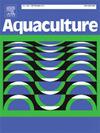Genomic differentiation and selection signatures of two elite varieties of Yesso scallop Mizuhopecten yessoensis
Abstract
Yesso scallop, Mizuhopecten yessoensis, is one of the most important bivalve species in aquaculture industry. Two selective improved varieties (Haida golden scallop and Zhangzidaohong) have been developed by artificial selection in recent years and exhibit good performance on growth and production traits. However, there's still a lack of comprehensive studies to analyze the population differentiation, genomic linkage disequilibrium patterns, as well as the selection signatures of the two elite varieties of Yesso scallop. In the present study, we performed whole genome resequencing of three groups of Yesso scallop to characterize the genetic changes resulted from selective breeding. A total of 9,534,749 high quality single nucleotide polymorphisms (SNPs) were discovered. The two selective varieties exhibited lower genetic diversity and retained relatively large linkage disequilibrium (LD) blocks compared to the reference population. Despite obvious stratification of the population structure of Yesso scallop, medium degrees of genetic differentiation (Fst < 0.15) was detected among the new varieties and the reference population. We highlighted several genes including LPCAT1 and TRAF reveal signatures of artificial selection and these genes would be potentially important for specific characteristics and improved performance in growth and resistance to diseases. The data and findings generated in our project would provide useful additions to currently available genomic resources for scallops and facilitate further genetic improvement and molecular studies in M.yessoensis.

 求助内容:
求助内容: 应助结果提醒方式:
应助结果提醒方式:


